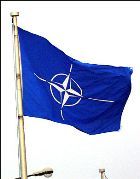Sudan welcomes NATO help in Darfur, but no troops
By Opheera McDoom
KHARTOUM, April 28 (Reuters) – Sudan said on Thursday it welcomed logistical or technical help from NATO in its troubled Darfur region, but did not want any of the 26-nation alliance’s troops be deployed on the ground.
 NATO said on Wednesday it was studying a request from the African Union, whose forces are monitoring a shaky ceasefire in Darfur, for help. A spokesman said talks would look at logistical support rather than any major deployment of troops.
NATO said on Wednesday it was studying a request from the African Union, whose forces are monitoring a shaky ceasefire in Darfur, for help. A spokesman said talks would look at logistical support rather than any major deployment of troops.
Foreign Minister Mustafa Osman Ismail told reporters in Khartoum President Omar Hassan al-Bashir had approved the request by the African Union (AU) for logistical support.
“We welcome any help whether logistical or technical help that NATO could offer to the AU in Darfur,” he said. “(But) the position of Sudan here is very clear — the Darfur case is … under the control of the AU so there is no way for personnel from NATO to be on the ground in Darfur.”
It would be the alliance’s first involvement in a mission on African soil.
AU soldiers in Darfur have complained of logistical problems which have hindered their operations.
The AU force is expected to be doubled to 6,000 and given a more robust mandate to protect civilians when the AU’s Peace and Security Council meets in Ethiopia on Thursday.
Ismail said Sudan would cooperate fully with the AU on the extra troops. But he had reservations about any extension of their mandate towards protecting civilians.
“The U.N. Security Council asked the government of Sudan to be fully responsible for the protection of civilians,” Ismail said. If any AU resolution contradicted this, “then definitely we need to remove this contradiction.”
He added any AU resolution giving full powers to protect civilians would need to be backed up by a U.N. Security Council resolution to be acceptable to Khartoum.
Tens of thousands have been killed in the fighting between the central government and allied militias and rebels, who accuse Khartoum of neglect and of giving preferential treatment to Arab tribes over non-Arabs. More than 2 million have fled their homes to makeshift camps in Darfur.
